#legal reforms
Text
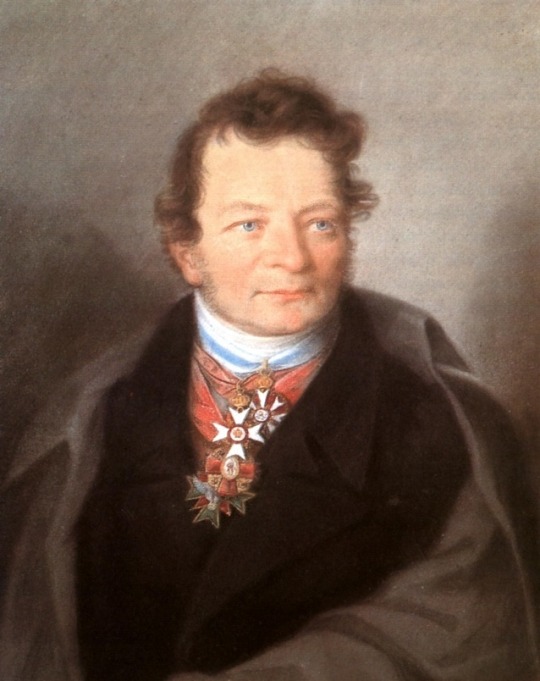
Paul Johann Anselm von Feuerbach, a German legal scholar.
Probably the best codification work of the Rhine Confederation period was the draft of a “General Civil Code for the Kingdom of Bavaria” from 1808-09, which was essentially based on the suggestions of Paul Johann Anselm von Feuerbach. By starting codification work, the Bavarian King Maximilian IV wanted to give in to Napoleon’s urging to introduce his code in Bavaria as well. In a report for the Ministry of Justice in 1808 “on the manner of introducing the Code Napoléon in a German country”, Feuerbach highlighted the main ideas of the Code Napoléon: freedom of the person; legal equality of subjects; equality of laws for all citizens of the state; freedom of property, as well as autonomy and independence of the state from the church in all civil matters. For him, the Napoleonic Code was a result of the French Revolution: “The purpose of French legislation was, on the one hand, to bring the Revolution to a complete end, and on the other, to perpetuate the beneficial results of the Revolution”.
Source: Werner Schubert, Der Code civil (Code Napoléon) in Deutschland und das Reichsgericht
#Werner Schubert#Schubert#Paul Johann Anselm von Feuerbach#Feuerbach#napoleonic era#code napoléon#napoleonic code#napoleonic#first french empire#Bavaria#Germany#Napoleon in Germany#napoleonic reforms#legal reforms#Napoleon the reformer#french revolution#frev#napoleon bonaparte#napoleon#19th century#history#Deutschland
7 notes
·
View notes
Text
Athelstan--Our Greatest Monarch?
Athelstan–Our Greatest Monarch?
A recent poll searching for Britain’s ‘Greatest Monarch’, came up with the surprise winner of… drum roll, King Athelstan. Not that the Anglo-Saxon king wasn’t so great, but the winner is a little surprising since most people seem to have believed the ‘crown’ would go to Elizabeth I. (Yawn!)
I hope the voters actually remembered Athelstan in reality and have not just recalled his name from…

View On WordPress
#"The last Kingdom"#Alfred#Anglo-Saxons#Athelstan#Bernard Cornwell#books#Brunaburh#Cheshire#Constantine II#Dissolution of the Monasteries#Eadgyth#Edward the Elder#Elizabeth I#Germany#House of Wessex#illegitimacy rumours#legal reforms#Malmesbury Abbey#novels#piety#royal burials#Scotland#St. Aldhelm#St. Cuthbert#Tom Holland#Venerable Bede#Vikings#York
3 notes
·
View notes
Text
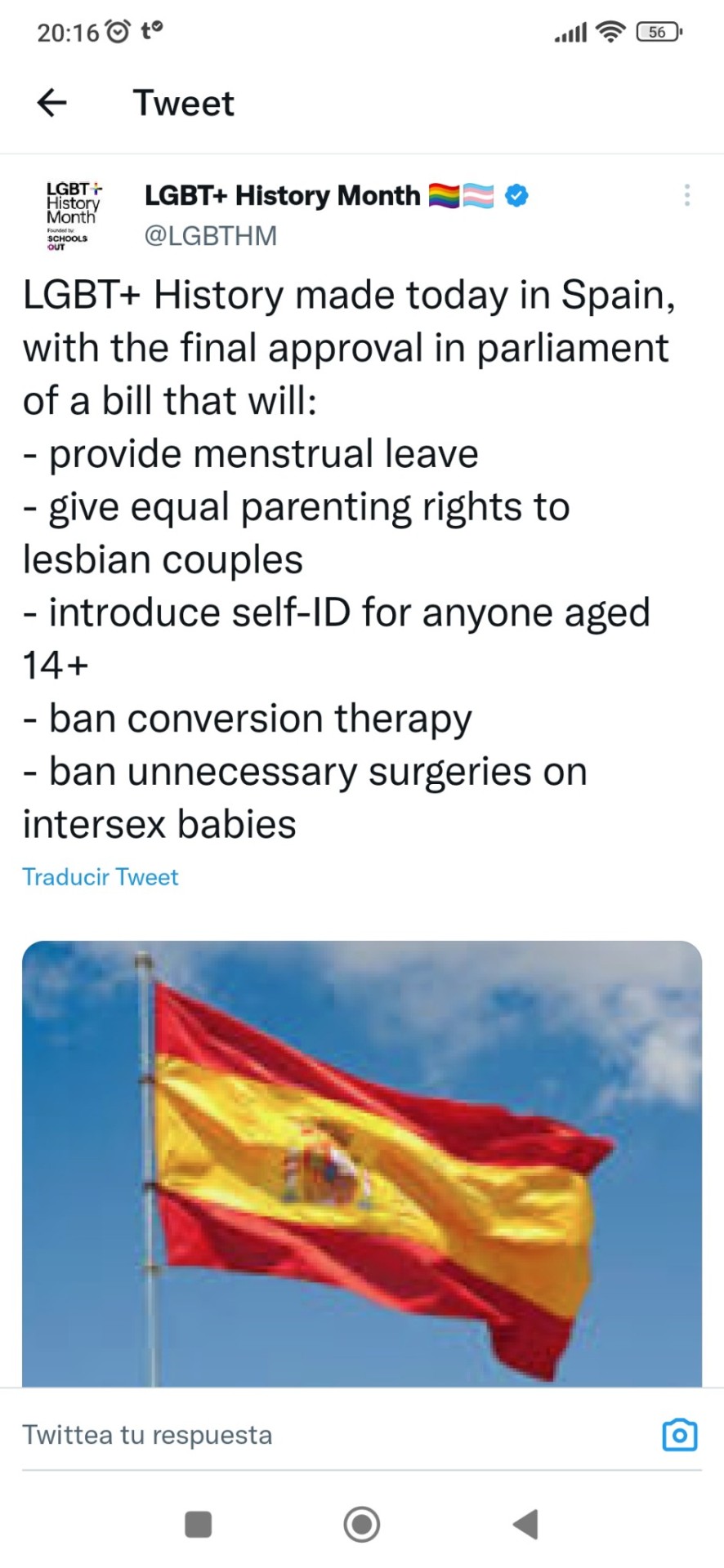

some good news!! the spanish state's ministry of equality has finally passed one of the most progressive trans laws on the planet, shielded free and universal access to abortion and banned conversion therapy and genital surgery for intersex babies, among a lot of other feminist policies. the minister of equality irene montero gave a speech thanking spain's lgtb and trans associations for helping her draft these legislations. couldn't be more proud!!
#spain#trans#ill always prioritize queer&trans revolution over reformism but man. man these are good news#these are gonna make people's life so much more comfortable#i was lucky enough to live in andalucia where we have THEE most advanced regional legislation on trans rights#so i didnt have to fight too many people to access hrt and to change my name on legal docs#but other ppl on the spanish state have been suffering so fucking much#and yeah this law doesnt cover non binary people or migrants but the door is fucking open. its a step forward#and after this terrible terrible week#after the antitrans antisemite game & brianna's murder and so many rampant transphobia#it feels nice to get a win#to have someone in power be so unwaveringly supportive#the queer community in the spanish state is NEVER gonna forget this. never#anyways!!!#felicidades gente trans española!!!! nos vemos en el registro civil dkkskdkkdkxkdk#mine
19K notes
·
View notes
Text
Corruption in Eastern Europe: A Roadblock to Fair Business Practices by Eastern European Institute for Trade

by Eastern European Institute for Trade
As the countries of Eastern Europe continue to integrate into the global economy, corruption remains a pernicious obstacle hindering the establishment of fair business practices and sustainable growth. This pervasive issue, which affects various facets of society, including political institutions, public administration, and private enterprises, undermines the region's potential for economic development and investment (Borcan et al., 2018). This article delves into the nature of corruption in Eastern Europe, its implications for the business environment, and potential strategies for addressing this deep-rooted problem (Johnson & Kuhn, 2017; Pellegrini & Radošević, 2011).
Transparency International's Corruption Perceptions Index (CPI) consistently ranks several Eastern European nations among the most corrupt countries globally, with bribery, embezzlement, and nepotism being prevalent issues (Transparency International, 2020). These illicit practices can discourage foreign investment and hinder local entrepreneurship, as they create an uneven playing field for businesses and perpetuate economic disparities (Borcan et al., 2018; Pellegrini & Radošević, 2011).
In addition to its direct economic consequences, corruption in Eastern Europe also has a corrosive effect on public trust and confidence in institutions. This erosion of faith in governance can lead to political instability, exacerbating the region's already fraught geopolitical climate (Johnson & Kuhn, 2017). Moreover, corruption undermines the rule of law and the effectiveness of regulatory frameworks, further constraining the potential for fair and transparent business practices (Mungiu-Pippidi, 2015).
Addressing corruption in Eastern Europe requires a multi-pronged approach that encompasses legal, institutional, and societal reforms. Firstly, strengthening the rule of law and enhancing the independence of judiciary systems are critical to ensuring the impartial enforcement of anti-corruption measures (Mungiu-Pippidi, 2015; Pellegrini & Radošević, 2011). This can include the establishment of specialized anti-corruption courts, as well as the promotion of transparent and merit-based appointment processes for judges and other key officials.
Secondly, fostering a culture of transparency and accountability in both public and private sectors is essential for combating corruption (Borcan et al., 2018). This can be achieved through the implementation of robust systems for the disclosure of conflicts of interest, the adoption of international best practices in public procurement, and the promotion of open data initiatives that enable public scrutiny of government and corporate activities (Johnson & Kuhn, 2017).
Lastly, engaging civil society and the media in anti-corruption efforts can be a powerful tool for raising awareness and promoting public vigilance against corrupt practices (Mungiu-Pippidi, 2015). By supporting the work of investigative journalists, whistleblowers, and non-governmental organizations, Eastern European countries can foster a more informed and engaged citizenry, capable of holding institutions and businesses accountable for their actions.
In conclusion, corruption in Eastern Europe poses a formidable challenge to the establishment of fair business practices and sustainable economic development. However, by implementing a comprehensive approach that addresses the legal, institutional, and societal dimensions of the problem, the region's nations can begin to dismantle the roadblocks posed by corruption and unlock their full potential for growth.
References:
Borcan, O., Olsson, O., & Putterman, L. (2018). State history and economic development: Evidence from six millennia. Journal of Economic Growth, 23(1), 1-40.
Johnson, S., & Kuhn, M. (2017). Corruption and economic development in Eastern Europe. Eastern European Economics, 55(4), 261-275
Mungiu-Pippidi, A. (2015). The quest for good governance: How societies develop control of corruption. Cambridge University Press.
Pellegrini, L., & Radošević, S. (2011). Knowledge-based economy and social capital in Central and Eastern Europe. Communist and Post-Communist Studies, 44(1), 19-32.
Transparency International. (2020). Corruption Perceptions Index 2020. Sourced from https://www.transparency.org/en/cpi/2020/index
Read more at the Eastern European Institute for Trade.
#Eastern European Institute for Trade#EEIT#Corruption#Eastern Europe#Fair business practices#Economic development#Transparency#Accountability#Rule of law#Judiciary systems#Bribery#Embezzlement#Nepotism#Foreign investment#Public trust#Regulatory frameworks#Legal reforms#Institutional reforms#Societal reforms#Public procurement#Open data initiatives#Civil society
0 notes
Text
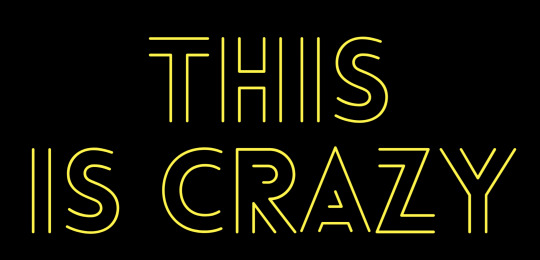
the fix is in!!
#Supreme Court corruption#judicial integrity#legal ethics#accountability#justice system reform#transparency#judicial independence#public trust#legal oversight#ethical standards#judicial misconduct#Supreme Court accountability#judicial power#political thuggery#institutional limits#checks and balances#public pressure#media coverage#judicial reform#democratic principles#constitutional interpretation#judicial impartiality#judicial appointments#separation of powers#government accountability#supreme court ruling#presidential immunity case#Trump legal arguments#congressional impeachment power#criminal charges
141 notes
·
View notes
Text

#happy “reformation day”#martin luther#for legal reasons this is a joke#catholic#file under caroline
327 notes
·
View notes
Text
Expanding on the Obito-is-smart-actually-he's-just-stupid-around-Kakashi AU from here, because it haunts me and I have many thoughts about it. (Note: while most of that can be interpreted as headcanon, and is an explanation of canon events, this post goes into an actual AU version, where canon events aren't followed, because I am gay and sad and cannot take it anymore.)
Normal Obito has an Actual Plan of things he wants to do when he becomes Hokage, including making sure no one clan can be discriminated against in law, building trade relations with other shinobi nations to create actual lasting alliances not built on war (like Kakashi post-canon lol), and actually doing something about the Hyuuga hierarchy stuff, with the help of Hiashi and Hizashi, who he's already created a sort-of-alliance with.
Obito-around-Kakashi is completely unable to articulate this, and instead ends up blurting out things like "fancy hat" and "people will like me," and looking like an indecisive fool who doesn't know what he's doing. Everyone who's interacted with Obito outside of Kakashi believes he can do it, and would do a good job. Unfortunately, Obito spends A Lot of time around Kakashi, including interacting with Most People, so the number who believe he'd make a good Hokage is... distressingly small.
One would think that, given he was able to function and activate a two-tomoe sharingan when Kakashi wasn't looking, he would be able to dodge the boulder fine while Kakashi was knocked out. Unfortunately, he'd just grabbed Kakashi to throw him out of the way, and without Protecting Kakashi being a direct motivator, holding Kakashi in his arms, even just to throw him out of the way, is enough to make Obito's brain stall completely for long enough to get canon'd.
Rin survives becoming a jinchuuriki because Obito trips and crashes wildly into the clearing when he sees Kakashi, and incidentally he ends up crashing into Rin just before she can jump in front of chidori. Unfortunately, Kakashi sees Obito and gets distracted long enough for an enemy to land a blow, and Obito, intelligence fully impaired by proximity to Kakashi, thinks Kakashi is dead. Mangekyo-activation and nigh-instantaneous death of every enemy shinobi in the vicinity ensues. And then Rin heals Kakashi. Because he's Not Dead.
The combination of passed-out Kakashi and Must-Protect-Precious-People allows Obito to tell Rin that Kushina's a jinchuuriki too (he got suspicious bc of the floating hair, and Kushina humored him when he asked), and her and Minato should be able to do something about the seal of the Sanbi. Needless to say, she's rather happy to stay alive and not have to horrifically traumatize one of her precious people.
#Kakashi to Obito: you're stupid but I love you.#Obito internally: I'm so in love with you and also I'm reforming the government and plan to reshape our society so that what happened#to your father can't happen again#and so that five-year-olds can't be made legal adults and get horrifically traumatized by the frontlines like you were#I would burn the world for you but you wouldn't like that so I'll just reform it instead#Obito externally: neat.#nurt#proximity to kakashi au#kakaobi#kakashi#naruto#obikaka#kkob#obkk#obito#hatake kakashi#kakashi x obito#uchiha obito#tobito
384 notes
·
View notes
Text
I think when a lot of queer people who aspire to marriage, and remember (rightly) fighting for the right to marriage, see queer people who don't want marriage, talking about not entering or even reforming or abolishing marriage, there's an assumption I can't fault anyone for having — because it's an assumption borne of trauma — that queers who aren't big on marriage are inadvertently or purposefully going to either foolishly deprive themselves of rights, or dangerously deprive everyone of the rights associated with marriage. But that's markedly untrue. We only want rights to stop being locked behind marriages. We want an end to discrimination against the unmarried.
We want a multitude of rights for polyamorous relationships. We want ways to fully recognize and extend rights to non-romantic and/or non-sexual unions, including but not limited to QPRs, in a setting distinct from the one that (modern) history has spent so long conflating with romance and sex in a way that makes many of us so deeply uncomfortable. And many of us are also disabled queers who are furious about marriage stripping the disabled of all benefits.
We want options to co-parent, and retain legal rights to see children, that extends to more than two people, and by necessity, to non-biological parents (which, by the way, hasn't always automatically followed from same-gender marriage equality even in places where said equality nominally exists. Our struggles are not as different as you think). We would like for (found or biological) family members and siblings to co-habitate as equal members of a household, perhaps even with pooled finances or engaging in aforementioned co-parenting, without anyone trying to fit the dynamic into a "marriage-shaped box" and assume it's incestuous. We want options to leave either marriages, or alternative agreements, that are less onerous than divorce proceedings have historically been.
I can't speak for every person who does not want to marry, but on average, spurning marriage is not a choice we make lightly. We are deeply, deeply aware of the benefits that only marriage can currently provide. And we do not take that information lightly. We demand better.
Now, talking about the benefits of marriage in respective countries' current legal frameworks, so that all people can make choices from an informed place, is all well and good — but is not an appropriate response to someone saying they are uncomfortable with marriage. There are people for whom entering a marriage, with all its associated norms, expectations, and baggage, would feel like a betrayal of one's self and authenticity that would shake them to their core — and every day, I struggle to unpack if I'm one of them or not. If I want to marry for tax benefits, or not. If that's worth the risk of losing disability benefits, in the (very plausible) possibility that I have to apply for them later in life. If that's worth the emotional burden of having to explain over and over, to both well-meaning and deeply conservative family members, that this relationship is not one of romance or sex. (Because, god, trying just to explain aromanticism or asexuality in a world that broadly thinks they're "fake" is emotional labor enough.)
Marriage is a fundamental alteration to who I am, to what rights an ableist government grants me, and to how I am perceived. I don't criticize the institution just because I enjoy a "free spirit" aesthetic or think the wedding industry is annoying, or whatever.
#to claim “gay marriage is assimilationist” is of course bullshit and ahistorical#but to claim “gay marriage is the last marriage reform we need” is even more bullshit. in the vein of “fuck you; i got mine”#amatonormativity#marriage#there's also something idk if i'm that qualified to articulate as a culturally christian person (even if nonreligious)#but concepts of marriage (or lack thereof) vary across the globe and across cultures#yet legal marriage - which crosses borders via presence in immigration law (in addition to obvious colonialism)#can impose extremely eurocentric norms onto countless people#which is a strong argument for separating spiritual/religious marriage from legal benefits tbh#they're *supposedly* separated in the US but you know obergerfell wouldn't have taken until 2015 if that was fully true
83 notes
·
View notes
Note
Why was queens pardoning prisoners seen as good? Like murders and sexual assaulter ect? Wouldn’t the public be against that?
This is an area where I think Foucault was actually right:
"...The public execution is to be understood not only as a judicial, but also as a political ritual. It belongs, even in minor cases, to the ceremonies by which power is manifested....
The public execution, then, has a juridico-political function. It is a ceremonial by which a momentarily injured sovereignty is reconstituted. It restores that sovereignty by manifesting it at its most spectacular. The public execution, however hasty and everyday, belongs to a whole series of great rituals in which power is eclipsed and restored (coronation, entry of the king into a conquered city, the submission of rebellious subjects); over and above the crime that has placed the sovereign in contempt, it deploys before all eyes an invincible force. Its aim is not so much to re-establish a balance as to bring into play, as its extreme point, the dissymmetry between the subject who has dared to violate the law and the all-powerful sovereign who displays his strength. Although redress of the private injury occasioned by the offence must be proportionate, although the sentence must be equitable, the punishment is carried out in such a way as to give a spectacle not of measure, but of imbalance and excess; in this liturgy of punishment, there must be an emphatic affirmation of power and of its intrinsic superiority. And this superiority is not simply that of right, but that of the physical strength of the sovereign beating down upon the body of his adversary and mastering it by breaking the law, the offender has touched the very person of the prince; and it is the prince - or at least those to whom he has delegated his force - who seizes upon the body of the condemned man and displays it marked, beaten, broken. The ceremony of punishment, then, is an exercise of 'terror'...
The sovereign power that enjoined him to kill, and which through him did kill, was not present in him; it was not identified with his own ruthlessness. And it never appeared with more spectacular effect than when it interrupted the executioner's gesture with a letter of pardon...The sovereign was present at the execution not only as the power exacting the vengeance of the law, but as the power that could suspend both law and vengeance. He alone must remain master, he alone could wash away the offences committed on his person; although it is true that he delegated to the courts the task of exercising his power to dispense justice, he had not transfered it; he retained it in its entirety and he could suspend the sentence or increase it at will." (emphasis mine)
Michel Foucault, Discipline and Punish, ch. 2
Unlike a modern conception of criminal justice, which is premised as an objective, rational, truth-seeking process in which precise identification of the right suspect and their level of guilt and the appropriate nature of their punishment, criminal justice systems in premodern Europe (although not necessarily limited to the same) were meant to emphasize the terrifying arbitrariness of royal power. With rituals put in place in order to ensure guilt through public (often coerced) confessions, the point wasn't whether the sheriff and the judge had "got the right man" or whether "the punishment fits the crime," but that the king could either enact public displays of bodily obliteration or public displays of mercy at their sole discretion.
In a sense, the pardoning of the guilty was a necessary justification for the deliberately disproportionate brutality of a pre-carceral system of punishment. This promoted the logic of submission to the guilty and innocent alike: if the king could sentence you to the ultimate physical dehumanization whether or not you were guilty, the only hope was either the mountain and forest refuge of the outlaw or the hope of a pardon as a quasi-divine act of unearned grace.
58 notes
·
View notes
Text
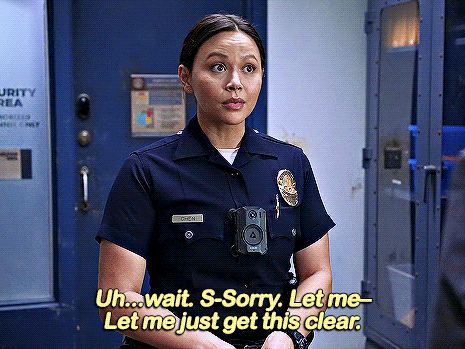
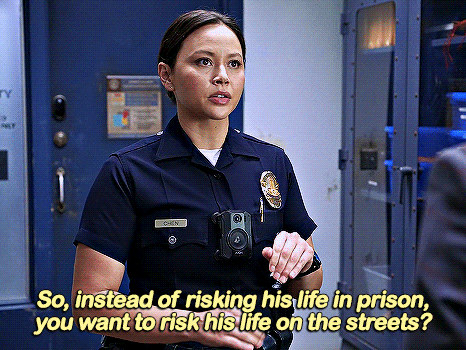








Let's continue with the positivity. Charge Tyler as a minor. He committed a crime with a gun. It was unloaded. Look, I'm not saying that there shouldn't be consequences, but he's 16. He's not old enough to drink, vote, join the military, and you want to lock him up with a bunch of grown men? Look, studies show that– No, please, don't quote studies at me. And definitely don't start lecturing me about the science of still-developing brains in men under 21. ... Look, if Tyler becomes a CI against his crew, I can definitely give him a break.
#30DAYSOFLUCY for PRIDE 2023
THE ROOKIE (2018) – 4x11 "End Game"
Melissa O'Neil as Lucy Chen
#the rookie#therookieedit#chenfordedit#melissa o'neil#30DAYSOFLUCY#tim bradford#chris sanford#the rookie s4#the rookie 411#id in alt#nothing like two men double-teaming a woman#to convince her that she's being dramatic#by strongly advocating for police reform#so that this kid can have a second chance at life#is over-caffeinated the legal term for the 'are you on your period?' question at the workplace#chenford#lucy chen#mine.gif#lucylessons
233 notes
·
View notes
Text
133 notes
·
View notes
Text
The Republican Party is at war with the American people.
#republican assholes#three strikes#criminal justice#courts target the poor#justice system targets minorities#court reform#legal system reform#Louisiana
23 notes
·
View notes
Text
Me in court facing 22 Counts Of Mayor Theft: your honor I'm about to shit myself
The Judge: Let the record show that the defendant is going to shit themselves.
Mayor: Uh oh.
#196#/r/196#r/196#r196#shitpost#im really high rn lol#im high#legal system#legal advice#prison reform#mayor#the joker
14 notes
·
View notes
Text
Languages: Deutsch
Experts are questioning the legality and effectiveness of France’s ban of TikTok in New Caledonia, imposed on Wednesday (15 May) to contain widespread protests that rocked the French overseas territory in the South Pacific.
The app ban was presented by the French government as complementary to the state of emergency, declared on Wednesday, and the deployment of armed forces in the overseas territory.
Protests erupted before a bill was passed in the National Assembly to revise New Caledonia’s body of people entitled to vote in provincial elections, allowing residents who have lived in the territory for over 10 years to vote. Independentists have been criticising this measure saying it would dilute the vote of the indigenous Kanak people.
According to the High Commission’s official count on Thursday (16 May), more than 200 rioters have been arrested and 64 law enforcement officers were injured in the past three days. Five people have been killed, according to the latest estimates.
According to the French government, messages of hate and calls for violence have been circulating on TikTok.
“This (unprecedented…) measure is related to the state of emergency regime. But the legality of this decision by the Ministry of the Interior, announced by (Prime Minister) Gabriel Attal, is questionable. Because the link with terrorism is more than doubtful…,” European law expert Nicolas Hervieu wrote on X.
TikTok said it has “received no requests or concerns about content from either the New Caledonian authorities or French government,” and is monitoring the situation.
continue reading
7 notes
·
View notes
Text
moderate conservative christian forced to correctly gender a trans person at work and thinks "wow i'm JUST like martin luther"
#i watched a documentary about the reformation and it ended with that dumbass ''the culture is against the church'' argument#your country was founded on christian ideals you are NOT being oppressed because people want abortion to be legalized#.txt
7 notes
·
View notes
Text
AN OPEN LETTER to THE PRESIDENT & U.S. CONGRESS; STATE GOVERNORS & LEGISLATURES
Support Marijuana Decriminalization for a more Equitable USA
4 so far! Help us get to 5 signers!
I am writing to express my strong support for the decriminalization of marijuana at both the federal and state levels. The current approach to cannabis, rooted in policies dating back to 1971, requires urgent reconsideration given evolving social norms and scientific understanding.
The revelation by President Richard Nixon's domestic policy chief, John Ehrlichman, that the war on drugs was designed to target Black communities underscores the urgent need to rectify the injustices perpetuated by decades of punitive drug policies. The disproportionate impact of these policies on communities of color has fueled systemic inequities in our criminal justice system.
Decriminalization of marijuana would shift our focus from ineffective punitive measures to evidence-based public health strategies, emphasizing harm reduction and regulated use, whether medicinal or recreational. It's crucial to differentiate between decriminalization and unregulated use, prioritizing public health and equitable access.
I urge you to champion legislation that decriminalizes marijuana and addresses the racial disparities entrenched by outdated drug policies. By investing in research and public health initiatives related to cannabis, we can develop policies that protect public health while respecting individual freedoms.
In conclusion, federal and state-level decriminalization of marijuana is imperative to rectify the failures of past policies and promote equitable, evidence-based drug reform. I urge you to seize this opportunity to advance sensible, ethical drug policy reforms that reflect our evolving understanding of cannabis regulation.
Thank you for considering my perspective on this critical matter. I look forward to your leadership in championing meaningful drug policy reform.
📱 Text SIGN PWUITK to 50409
🤯 Liked it? Text FOLLOW IVYPETITIONS to 50409
💘 Q'u lach' shughu deshni da.
🏹 "What I say is true" in Dena'ina Qenaga
#IVYPETITIONS#PWUITK#resistbot#petition#anti racism#racial justice#Marijuana Decriminalization#Cannabis Reform#Drug Policy#Social Justice#Equity#Legalize It#Public Health#Criminal Justice Reform#Racial Justice#Civil Rights#Drug Law Reform#Decriminalize Marijuana#Justice Reform#Drug Policy Reform#End Mass Incarceration#Policy Change#Advocacy#Community Health#Health Equity#Legalization#Racial Equality#Social Change#Drug Reform#Human Rights
8 notes
·
View notes